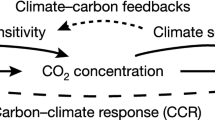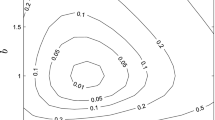Abstract
We present how uncertainty and learning are classically studied in economic models. Specifically, we study a standard expected utility model with two sequential decisions, and consider two particular cases of this model to illustrate how uncertainty and learning may affect climate policy. While uncertainty has generally a negative effect on welfare, learning has always a positive, and thus opposite, effect. The effects of both uncertainty and learning on decisions are less clear. Neither uncertainty nor learning can be used as a general argument to increase or reduce emissions today without studying the specific intertemporal costs and benefits. Considering limits in applying the expected utility framework to climate change problems, we then consider a more recent framework with ambiguity-aversion which accounts for situations of imprecise or multiple probability distributions. We discuss both the impact of ambiguity-aversion on decisions and difficulties in applying such a non-expected utility framework to a dynamic context.
Similar content being viewed by others
References
Allais M (1953) Le comportement de l’homme rationnel devant le risque: critiques des postulats et axiomes de l’ecole américaine. Econometrica 21:503–546
Arrow KJ (1971) Essays in the theory of risk bearing. Markham Publishing Co
Arrow K, Fischer A (1974) Environmental preservation, uncertainty and irreversibility. Q J Econ 88:312–319
Blackwell D (1951) Comparison of experiments. In: Neyman J (ed) Proceedings of the Second Berkeley Symposium on Mathematical Statistics and Probability. University of California Press, Berkeley
Bohnenblust HF, Shapley LS, Sherman S (1949) Reconnaissance in game theory. The Rand Corporation
Camerer C, Weber M (1992) Recent developments in modeling preferences: uncertainty and ambiguity. J Risk Uncertain 5:325–370
Eeckhoudt L, Gollier C, Schlesinger H (2005) Economics and financial decisions under risk. Princeton University Press
Eeckhoudt L, Gollier C, Treich N (2005) Optimal consumption and the timing of the resolution of uncertainty. Eur Econ Rev 49:761–773
Ellsberg D (1961) Risk ambiguity and the savage axioms. Q J Econ 75:643–669
Epstein L (1980) Decision-making and the temporal resolution of uncertainty. Int Econ Rev 21:269–284
Epstein LG, Le Breton M (1993) Dynamically consistent beliefs must be Bayesian. J Risk Uncertain 61:1–22
Epstein LG, Schneider M (2003) Recursive multiple priors. J Econ Theory 113:1–31
Gilboa I (1987) Expected utility with purely subjective non-additive probabilities. J Math Econ 16:65–88
Gilboa I, Schmeidler D (1989) Maximin expected utility with non-unique prior. J Math Econ 18:141–153
Gollier C, Jullien B, Treich N (2000) Scientific progress and irreversibility: an economic interpretation of the precautionary principle. J Public Econ 75:229–253
Ha-Duong M (1998) Quasi-option value and climate policy choices. Energy Econ 20:599–620
Hardy GH, Littlewood JE, Polya G (1934) Inequalities. Cambridge University Press
Henry C (1974) Investment decisions under uncertainty: the irreversibility effect. Am Econ Rev 64:1006–1012
Hirshleifer J, Riley JG (1992) The analytics of uncertainty and information. Cambridge University Press
Intergovernmental Panel on Climate Change (IPCC) (1995) Economic and social dimensions of climate change. Cambridge University Press, UK
Intergovernmental Panel on Climate Change (IPCC) (2005) Guidance notes for lead authors of the IPCC Fourth Assessment Report on addressing uncertainties (http://www.ipcc.ch/activity/uncertaintyguidancenote.pdf)
Jones J, Ostroy R (1984) Flexibility and uncertainty. Rev Econ Stud 6:13–32
Kahneman D, Tversky A (1979) Prospect theory: an analysis of decision under risk. Econometrica 47:263–291
Karni E, Safra Z (1989) Ascending bid auctions with behaviorally consistent bidders. Ann Oper Res 19:435–446
Karni E, Schmeidler D (1991) Atemporal dynamic consistency and expected utility. J Public Econ 54:401–408
Kimball M (1990) Precautionary savings in the small and in the large. Econometrica 61:53–73
Klibanoff P (2001) Characterizing uncertainty aversion through preference for mixtures. Soc Choice Welf 18:289–301
Klibanoff P, Marinacci M, Mukerji S (2005) A smooth model of decision making under ambiguity. Econometrica 73(6):1849–1892
Klibanoff P, Marinacci M, Mukerji S (2006) Recursive smooth ambiguity preferences. Working paper
Kolstad CD (1996) Fundamental irreversibility in stock externalities. J Public Econ 60:221–233
Kolstad, C D, Ulph A (2008) Learning and international environmental agreements. Climatic Change (this issue). DOI 10.1007/s10584-008-9399-8
Lange A (2003) Climate change and the irreversibility effect—combining expected utility and maxmin. Environ Resour Econ 25:417–434
Leland H (1968) Savings under uncertainty: the precautionary demand for savings. Q J Econ 45:621–636
Machina MJ (1989) Dynamic consistency and non-expected utility models of choice under uncertainty. J Econ Lit 27:1622–1668
Manne AS, Richels R (1992) Buying greenhouse insurance: the economic cost of CO2 emissions limits. The MIT Press, Cambridge
Marschak J, Miyasawa K (1968) Economic comparability of information systems. Int Econ Rev 9(2):137–174
Mas-Collel A, Whinston MD, Green JR (1995) Microeconomic theory. Oxford University Press
Morgan MG, Keith DW (1995) Subjective judgments by climate experts. Environ Sci Technol 29:468A–476A
Narain U, Hanemann WM, Fisher AC (2007) The irreversibility effect in environmental decisionmaking. Environ Resour Econ 38:391–405
Neumann Jv, Morgenstern O (1944) Theory of games and economic behavior. Princeton University Press, Princeton, NJ
Nordhaus DW (1994) Managing the global commons. The MIT Press, Cambridge
Oppenheimer M, O’Neill BC, Webster M (2008) Negative learning. Climatic Change (this issue). DOI 10.1007/s10584-008-9405-1
Pratt J (1964) Risk aversion in the small and in the large. Econometrica 32:122–136
Rothschild MJ, Stiglitz J (1970) Increasing risk I: a definition. J Econ Theory 2:225–243
Rothschild MJ, Stiglitz J (1971) Increasing risk II: Its economic consequences. J Econ Theory 3:66–84
Samuelson PA (1967) General proof that diversification pays. J Financ Quant Anal 2:1–13
Schmeidler D (1989) Subjective probability and expected utility without additivity. Econometrica 57:571–587
Ulph A, Ulph D (1997) Global warming, irreversibility and learning. Econ J 107:636–50
Wakker PP (1988) Nonexpected utility as aversion to information. J Behav Decis Mak 1:169–175
Author information
Authors and Affiliations
Corresponding author
Rights and permissions
About this article
Cite this article
Lange, A., Treich, N. Uncertainty, learning and ambiguity in economic models on climate policy: some classical results and new directions. Climatic Change 89, 7–21 (2008). https://doi.org/10.1007/s10584-008-9401-5
Received:
Accepted:
Published:
Issue Date:
DOI: https://doi.org/10.1007/s10584-008-9401-5




